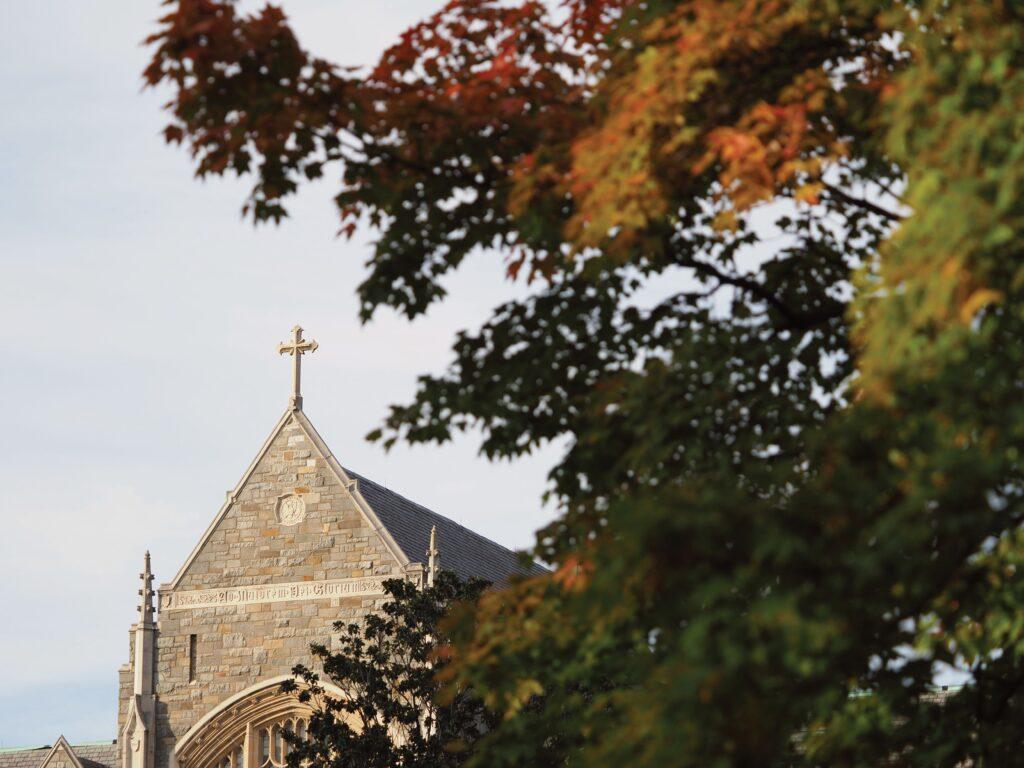CW: This article discusses clerical sexual abuse. Please refer to the end of the article for on and off-campus resources.
Listening to survivors of sexual abuse within the Catholic Church is fundamental to making recommendations for change, survivors and experts say.

At the Nov. 16 virtual event, titled “Prière De Ne Pas Abuser (Please Do Not Abuse): Listening to the Voices of Survivors,” experts shed light on a newly released report on the rates of sexual abuse in the Catholic Church in France and the importance of listening to survivors. Clerical abuse survivor and Jesuit theologian Rev. Patrick Goujon, S.J., discussed his new book in the event hosted by Georgetown University’s Berkley Center for Religion, Peace and World Affairs, which also featured panelist Laëtitia Atlani-Duault, a member of the 2021 French Independent Commission on Sexual Abuse in the Church.
The stigma around sexual abuse and lack of resources for support means the process of coming to terms with experiencing abuse is often an ongoing, life-long struggle, according to Goujon.
“When I decided to write this book, it was an answer to a necessity for me not to be lost in my own story. In a way, I have totally forgotten what happened to me. It has totally disappeared. And when it suddenly came back much later in my life, which was so disturbing, I was really lost,” Goujon said at the event. “It was at the same time really painful, but also a real gift. In fact, I decided to write not to be lost, but also not to lose what I was discovering.”
For Rev. Goujon, the shame of being abused was compounded with that of being a spiritual director, and the ‘physician heal thyself’ presumption that comes with the profession.
“As a Jesuit trained and sent to be a spiritual director, one of the reasons for that was that I have a good capacity to understand my own life, to listen to people. So there was something intangible for me in that,” Rev. Goujon said at the event.
Panelists also discussed a report by the Independent Commission on Sexual Abuse in the Church, comissioned by the Vatican itself, which estimated that clergy members in the Roman Catholic Church in France sexually abused over 200,000 minors over the last 70 years. According to Goujon, statistics on sexual abuse are hard to obtain or even estimate because many cases go unreported.
For many survivors, the guilt associated with sexual abuse and the lack of a support system for suvivors within the church makes it very difficult to seek help, according to Goujon.
“At the very beginning, just a few weeks after I realized what happened to me, I spoke to my Jesuit spiritual director and he suggested me not to speak of it,” Goujon said. “It was certainly not the best advice I received in my Jesuit life, and it was a real sign of what usually happens.”
The study conducted by the independent commission centered around listening to the stories of survivors rather than just analyzing cold statistics, according to Atlani-Duault.
“If you read the report it is full of the voices of victims. Each analysis is based on quotes that I selected, not only to have their voices represented but also to build our understanding of the phenomenon and our recommendations on the very specific testimonies of the victims,” Atlani-Duault said at the event. “What is clear in all the survivors’ testimonies is the fact that they were forced, and that they are now alone, facing long-term consequences of what happened.”
The massive number of testimonies revealed not only the magnitude of clerical sexual abuse, but also the current necessity for a solution, according to Atlani-Duault.
“What is striking in our report is how these lonely experiences are massive, systematic and organized,” Atlani-Duault said. “They have been long covered by silence, displacement of abusers and the avoidance of the French Republic law system — and they are actual, it’s not just something from the past.”
Goujon said it is imperative the church actively listens to survivor’s stories.
“Even if you are not making a lot of noise, because someone who has suffered doesn’t shout, you have to listen to the very low side, the children, all of them, the adjuncts who have been victims,” Goujon said at the event. “The reason why I decided to make this story public is to encourage that.”Resources: On-campus resources include Health Education Services (202-687-8949) and Counseling and Psychiatric Service (202-687-7080); additional off-campus resources include the D.C. Rape Crisis Center (202-333-7273) and the D.C. Forensic Nurse Examiner Washington Hospital Center (844-443-5732). Individuals can also report sexual misconduct by a Jesuit by contacting the province’s survivor advocate at [email protected]. If you or anyone you know would like to receive a sexual assault forensic examination or other medical care — including emergency contraception — call the Network for Victim Recovery of D.C. at 202-742-1727. To report sexual misconduct, you can contact Georgetown’s Title IX coordinator at 202-687-9183 or file an online report here. Emergency contraception is available at the CVS located at 1403 Wisconsin Ave NW and through H*yas for Choice. For more information, visit sexualassault.georgetown.edu.








